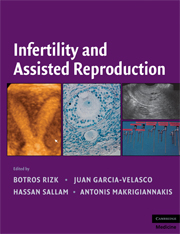Book contents
- Frontmatter
- Contents
- Contributors
- Foreword
- Preface
- Introduction
- PART I PHYSIOLOGY OF REPRODUCTION
- PART II INFERTILITY EVALUATION AND TREATMENT
- PART III ASSISTED REPRODUCTION
- PART IV ETHICAL DILEMMAS IN FERTILITY AND ASSISTED REPRODUCTION
- 69 Stem Cell Research
- 70 Fertility Preservation in Female and Male Cancer Patients
- 71 Ethical Dilemmas in ART: Current Issues
- 72 Infertility Treatment in Perimenopausal Women: Ethical Considerations
- 73 Religious Perspectives of Ethical Issues in Inferility and ART
- 74 The Future of Assisted Reproduction
- Index
- Plate section
- References
72 - Infertility Treatment in Perimenopausal Women: Ethical Considerations
from PART IV - ETHICAL DILEMMAS IN FERTILITY AND ASSISTED REPRODUCTION
Published online by Cambridge University Press: 04 August 2010
- Frontmatter
- Contents
- Contributors
- Foreword
- Preface
- Introduction
- PART I PHYSIOLOGY OF REPRODUCTION
- PART II INFERTILITY EVALUATION AND TREATMENT
- PART III ASSISTED REPRODUCTION
- PART IV ETHICAL DILEMMAS IN FERTILITY AND ASSISTED REPRODUCTION
- 69 Stem Cell Research
- 70 Fertility Preservation in Female and Male Cancer Patients
- 71 Ethical Dilemmas in ART: Current Issues
- 72 Infertility Treatment in Perimenopausal Women: Ethical Considerations
- 73 Religious Perspectives of Ethical Issues in Inferility and ART
- 74 The Future of Assisted Reproduction
- Index
- Plate section
- References
Summary
The number of women seeking treatment for infertility continues to grow. It is estimated that approximately 1 in 136 or two million people in United States are infertile (1). These numbers are explained, in part, by an age-related decline in fertility that is well documented in the medical literature. Despite the availability of new technologies such as in vitro fertilization (IVF), this age-related loss of fertility cannot be overcome by the use of assisted reproductive technologies (ART), if donor oocytes are not used (2–10).
ART has been viewed as a panacea for perimenopausal women seeking motherhood late in their reproductive lives. According to the 2003 CDC Assisted Reproductive Technology Report (11), 20 percent of women seeking ART were of the age of forty and older. Most women in this age-group either delayed childbearing to pursue higher education and careers, or are part of the large cohort of women born during the “baby boom” (1946–1964) period. Although these women can have spontaneous pregnancies, the likelihood of pregnancy and live birth is less than 1–2 percent in those older than forty-three (11), and the time to conception can be prolonged.
Age is the most important factor affecting the chance of a live birth when a woman uses her own eggs. Among women in their twenties, pregnancy and live birth rates are relatively stable; and decline steadily from the mid-thirties onward (11).
Keywords
- Type
- Chapter
- Information
- Infertility and Assisted Reproduction , pp. 723 - 727Publisher: Cambridge University PressPrint publication year: 2008

